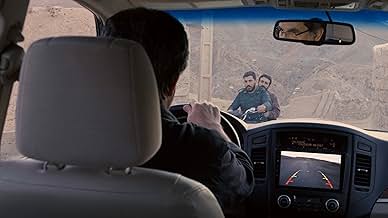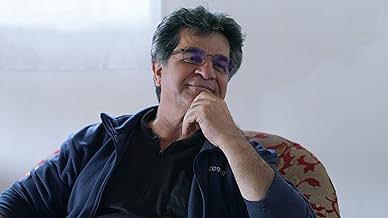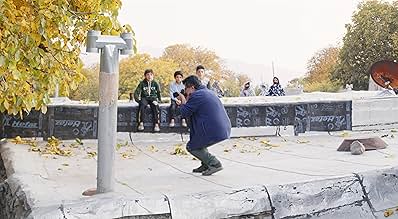IMDb-BEWERTUNG
7,2/10
4681
IHRE BEWERTUNG
Folgen Sie Anders Hofman, dem ersten Menschen, der einen Iron-Man-Triathlon in der Antarktis absolviert hat.Folgen Sie Anders Hofman, dem ersten Menschen, der einen Iron-Man-Triathlon in der Antarktis absolviert hat.Folgen Sie Anders Hofman, dem ersten Menschen, der einen Iron-Man-Triathlon in der Antarktis absolviert hat.
- Auszeichnungen
- 4 Gewinne & 8 Nominierungen insgesamt
Bakhtiyar Panjeei
- Bakhtiar
- (as Bakhtiar Panjei)
Narges Delaram
- Ghanbar's mother (Madar_e Ghanbar)
- (as Narjes Delaram)
Reza Heidari
- Reza
- (as Reza Heydari)
Aliye Tuzun
- Police
- (as Aliye Tüzün)
Empfohlene Bewertungen
Director Jafar Panahi is midway in his imprisonment/house arrest in Iran, a victim of a relentless Islamic theocracy. That little matter hasn't kept him from making five films, sometimes using technology to direct remotely, for instance, his current "No Bears," in which he depicts himself directing a film within the film. Directing a Turkish town from a place near the Iranian border lends a romance to an otherwise mortally-dangerous enterprise.
His films show how he fights the restrictions of the regime on his art. All five in some way or another may reveal his oppression and lack of artistic autonomy. Panahi's films reflect his late mentor, Abbas Kiarostami, and his challenging tension between "narrative" and "documentary," when a camera seems to play between fiction and reality.
Because he hasn't been allowed to leave Iran for 10 years, his movies have a cachet usually relegated to an artistic outlaw: "This Is Not a Film," "Closed Curtain," "Taxi" and "3 Faces" are almost classics. New Yorker magazine says "No Bears" is one of the best dramas of the year, and they're right.
In No Bears, after a wild opening in which an exiled Iranian couple argue in the street about a corrupt passport and escape into Europe, we realize it's a scene from the movie he is remotely directing. Then we are thrown into a Romeo and Juliet mash up that leaves Panahi's director at the mercy of local forces, both official and citizenry, who lay tradition and family rumbling at his feet for a photo disc he allegedly has that would resolve a fight over an arranged marriage.
Panahi's director claims he has no such compromising photo of the couple, but he shows little respect for the local traditions inherent in the love affair. Underneath, of course, is his comment on cinema as a means of discerning truth in a culture of fake news. The scene of Panahi feverishly looking for cellphone reception smartly underscores the struggle to find truth.
At the least, No Bears is a profound statement about the power of filmmaking as it clashes with custom and reality. It is a masterful meta-fiction that tells a complicated cultural tale and the fraught participation of cinema. 80 for Brady it is not.
His films show how he fights the restrictions of the regime on his art. All five in some way or another may reveal his oppression and lack of artistic autonomy. Panahi's films reflect his late mentor, Abbas Kiarostami, and his challenging tension between "narrative" and "documentary," when a camera seems to play between fiction and reality.
Because he hasn't been allowed to leave Iran for 10 years, his movies have a cachet usually relegated to an artistic outlaw: "This Is Not a Film," "Closed Curtain," "Taxi" and "3 Faces" are almost classics. New Yorker magazine says "No Bears" is one of the best dramas of the year, and they're right.
In No Bears, after a wild opening in which an exiled Iranian couple argue in the street about a corrupt passport and escape into Europe, we realize it's a scene from the movie he is remotely directing. Then we are thrown into a Romeo and Juliet mash up that leaves Panahi's director at the mercy of local forces, both official and citizenry, who lay tradition and family rumbling at his feet for a photo disc he allegedly has that would resolve a fight over an arranged marriage.
Panahi's director claims he has no such compromising photo of the couple, but he shows little respect for the local traditions inherent in the love affair. Underneath, of course, is his comment on cinema as a means of discerning truth in a culture of fake news. The scene of Panahi feverishly looking for cellphone reception smartly underscores the struggle to find truth.
At the least, No Bears is a profound statement about the power of filmmaking as it clashes with custom and reality. It is a masterful meta-fiction that tells a complicated cultural tale and the fraught participation of cinema. 80 for Brady it is not.
Telling the truth is difficult for Iranian filmmakers. You have Government control on one hand (the real tale of Panahi remotely directing a film being shot in Turkey while stationed on the borders of Iran as he is not allowed to leave the country) and you have quaint traditions on the other (in the Iranian villages on the border) that often lead to tragedy. However good your intent, the road is bumpy and leads you to a sad, nihilistic end. Intelligent filmmaking that captures the difficulty of renowned filmmakers to capture the Kafkesque ground reality in Iran and the frustrations of Iranian nationals today. Deserved the Special Jury Prize at Venice.
A most excellent movie ! Thoroughly enjoyed it. For sure there were many layers and implicit meanings I missed but that is also what made this film so intriguing. The contrast between the mountain town in Iran and the city in Turkey, all the details, the character extras that clearly showed the cultural differences, I loved that. The border, the trafficking that was implied, the faithfulness to truth of the central actor who is also the director. It's also a movie that celebrates movie making, how storytelling prevails in film, the impact of a story upon the storyteller. It´s a very poignant movie.
Wonderful footage in a documentary style, great story, amazing insight into life on the frontier.
Well worth seeing.
Wonderful footage in a documentary style, great story, amazing insight into life on the frontier.
Well worth seeing.
The film "No Bears" starts off simple but becomes more complex as it progresses. Even if you're not familiar with the work of Kiarostami and Makhmalbaf, you can still enjoy it. The director, Panahi, mixes documentary-style and autobiographical elements to create a powerful emotional impact. Panahi, who is at the center of the film, is forced to confront the consequences of his work, both for himself and his collaborators. The final image of the film is sobering and resonates with the unspoken anguish of an artist exiled in his own country, who has had enough. It is clear that the director has little left to lose, and this makes "No Bears" one of the best movies of the previous year.
A masterfully crafted film that showcases the incredible talent of Iranian director Jafar Panahi. Despite facing constant harassment and a six-year prison sentence on baseless charges, Panahi continues to push the boundaries of cinema with his deeply personal and thought-provoking work.
In "No Bears," Panahi plays a fictionalized version of himself as he directs a film remotely from the Iranian village of Joban, near Turkey. When his WiFi goes out, he becomes intrigued by a local ceremony and loans one of his cameras to a villager to document it. The film then follows two parallel tracks: the story of Bakhtiar and Zara, which serves as a reconstruction of a real-life event, and the recording of the ceremony, which opens up a can of worms in the village as it is used as evidence against a young woman accused of having premarital relations.
Throughout the film, Panahi deftly explores themes of truth-telling, social activism, and the blurred lines between reality and fiction. The acting is superb, with Bakhtiar and Zara's tumultuous relationship feeling both realistic and emotionally charged. The cinematography and direction are also top-notch, with the film's remote setting adding to its sense of isolation and tension.
Overall, "No Bears" is a powerful and thought-provoking film that showcases the resilience and determination of its director. It is a must-see for fans of Panahi's work and anyone interested in the intersection of art and politics.
In "No Bears," Panahi plays a fictionalized version of himself as he directs a film remotely from the Iranian village of Joban, near Turkey. When his WiFi goes out, he becomes intrigued by a local ceremony and loans one of his cameras to a villager to document it. The film then follows two parallel tracks: the story of Bakhtiar and Zara, which serves as a reconstruction of a real-life event, and the recording of the ceremony, which opens up a can of worms in the village as it is used as evidence against a young woman accused of having premarital relations.
Throughout the film, Panahi deftly explores themes of truth-telling, social activism, and the blurred lines between reality and fiction. The acting is superb, with Bakhtiar and Zara's tumultuous relationship feeling both realistic and emotionally charged. The cinematography and direction are also top-notch, with the film's remote setting adding to its sense of isolation and tension.
Overall, "No Bears" is a powerful and thought-provoking film that showcases the resilience and determination of its director. It is a must-see for fans of Panahi's work and anyone interested in the intersection of art and politics.
Wusstest du schon
- WissenswertesActually, the entire scene shot in Istanbul Kadikoy, not in Turkish border town.
Top-Auswahl
Melde dich zum Bewerten an und greife auf die Watchlist für personalisierte Empfehlungen zu.
- How long is No Bears?Powered by Alexa
Details
Box Office
- Bruttoertrag in den USA und Kanada
- 167.333 $
- Eröffnungswochenende in den USA und in Kanada
- 6.173 $
- 25. Dez. 2022
- Weltweiter Bruttoertrag
- 1.196.288 $
- Laufzeit
- 1 Std. 46 Min.(106 min)
- Farbe
- Seitenverhältnis
- 1.85 : 1
Zu dieser Seite beitragen
Bearbeitung vorschlagen oder fehlenden Inhalt hinzufügen























